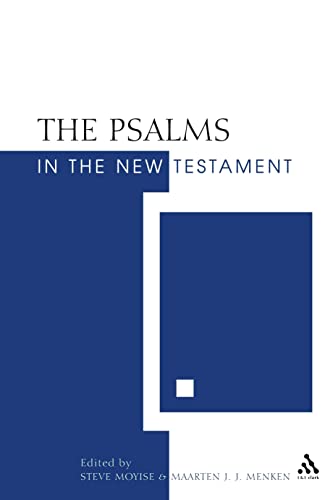THE PSALMS IN THE NEW TESTAMENT
Written by Steve Moyise and Maarten J. J. Menken (eds) Reviewed By Jamie GrantThis collection of essays originates from the annual, ‘The Use of the Old Testament in the New Testament’ seminar. This is the first in a series of publications which focus on the complex question of how the New Testament writers make use of Old Testament texts, including Isaiah in the New Testament and Deuteronomy in the New Testament (forthcoming). In each of these volumes, scholars from a variety of backgrounds discuss the use of a particular book of the Old Testament (in the case the Psalms) in the various books and genres of the New Testament.
It begins with a study of the Psalms in ‘Early Jewish Literature and the Dead Sea Scrolls’ by George J. Brooke. This study reflects the diversity of scholarly opinion that exists regarding how the Qumran evidence should be read, especially calling for greater consideration of the less-commonly discussed Psalms texts found at Qumran (e.g. 4Q448 etc.) alongside the more complete scrolls that receive the bulk of scholarly attention (e.g. 11QPsa). Rikk Watts then discusses Mark’s use of the Psalms, pointing out that the evangelist uses the four psalms that are commonly associated with Christ (Psalms 2, 22, 110, 118) at least twice in his gospel. In this way, Mark points to the Davidic messiahship of Jesus, his rejection by the people, his role as suffering servant and his ultimate exaltation. Michael Labahn’s discussion of ‘The Psalms in Q’ is inevitably open to much conjecture and debate, but may be helpful to those working in this particular area. Maarten Menken’s discussion of ‘The Psalms in Matthew’ follows, obviously reflecting the editors’ view on questions of historical priority in the Gospels. He argues that Matthew probably made use of a variety sources (but dominated by the LXX) in adopting Psalmic quotations into his gospel. Typically for this New Testament author, he uses verses from the Psalms in order to show ideas of Old Testament fulfilment in the person of Christ, with particular regard (again) to Jesus as the promised Davidic Messiah.
Peter Doble’s article on Luke-Acts is one of the longest, justifiably so given the number of quotations from the Psalms in these books. Doble concludes, perhaps predictably, that Luke most likely used the LXX as his source of psalms texts and also that he deliberately used the psalms to make the argument that God’s promise of an eternal kingdom to David is fulfilled through Jesus’ life and continuing reign. Margaret Daly-Denton argues that the voice of ‘ “David” the psalmist is both overtly quoted and subliminally influential in the fourth gospel portrayal of Jesus. There is no doubt that the book of “the scriptures” that the fourth evangelist favours most as a witness to Jesus has exerted a profound influence on his composition’ (137).
Sylvia Keesmaat picks up on Bruggemann’s description of the psalms as displaying characteristics of ‘orientation, disorientation and reorientation’ in her discussion of Paul’s use of the Psalter. In particular, Paul presents the sinfulness of humanity, the suffering of the Christian community in Rome and the unbelief of Israel using the lament language of the Psalter (psalms of disorientation, e.g. Psalm 44), before considering ideas of a new community and new justice using psalms of reorientation (e.g. Psalms 18, 117). Drake Williams on 1 and 2 Corinthians and Thorsten Moritz on Ephesians and Colossians both show that Paul deliberately uses psalms of different types to make particular points that are relevant to the advancement of his argument in a given setting. So he uses a wisdom psalm to make ‘character-consequence’ type arguments in Corinthians and a creation psalm and a royal psalm to describe Christ as Creator and king in Ephesians.
Harold Attridge’s fascinating article tells us that, ‘The Epistle to the Hebrews resonates with the Psalms’ (197). In particular, Psalms 110 serves as something of a structural indicator throughout the letter emphasizing the writer’s central theme of Christ’s supremacy. Also when God speaks to his Son in the Hebrews and when Jesus himself speaks, interestingly, it is often using the words of psalms. Sue Woan shows that Psalms 118 and 34 have a significant function in Peter’s first epistle. The book concludes with Steve Moyise’s fascinating discussion of the Psalms in Revelation where Psalm 2 is used to testify to the ultimate victory of Christ. John also uses Psalm 89 to point to Jesus as ‘firstborn, faithful witness and ruler of the kings of the earth’ (245) and describes the eschatological ingathering of the nations using Psalm 86.
As is always the case with any collection of essays, readers will find some of the articles more engaging and helpful than others, but overall this is a very worthwhile volume with a number of articles of very high quality. Anyone interested in the question of how the psalms are used in the New Testament will find much of great benefit in this work.
Jamie Grant
Highland Theological College, Dingwall







